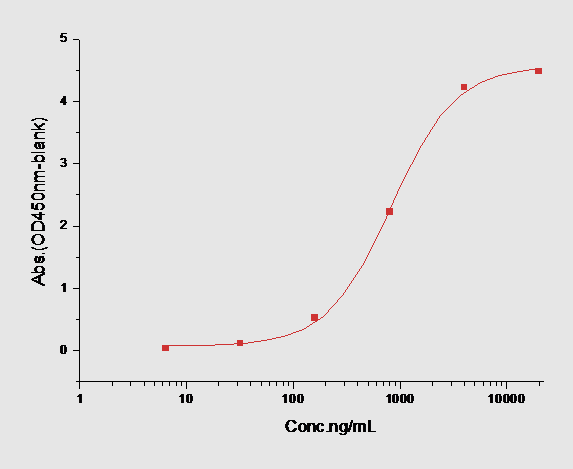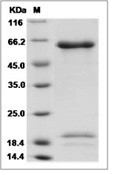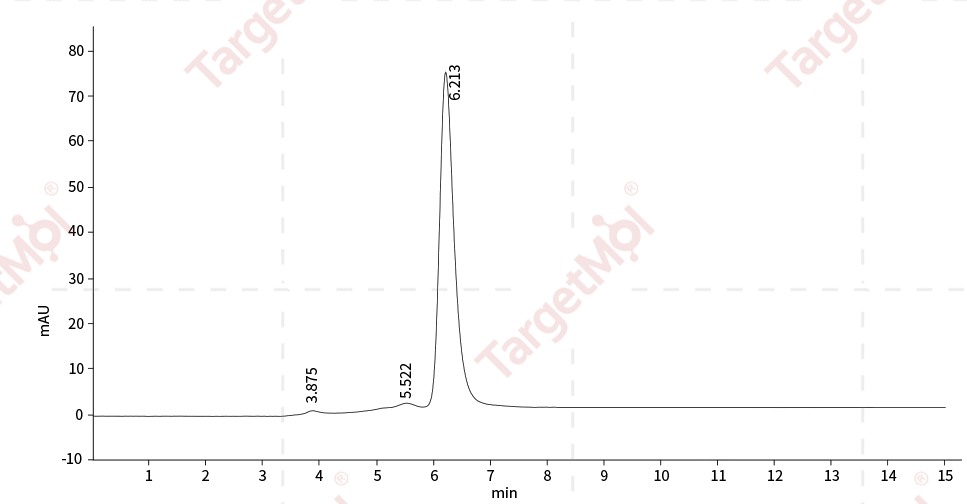Shopping Cart
- Remove All
 Your shopping cart is currently empty
Your shopping cart is currently empty

PCSK9 Protein, Human, Recombinant (D374Y & V474I & G670E, His) is expressed in HEK293 mammalian cells with His tag. The predicted molecular weight is 72.6 kDa and the accession number is AAV67948.1.

| Pack Size | Price | Availability | Quantity |
|---|---|---|---|
| 50 μg | $386 | In Stock | |
| 100 μg | $602 | 7-10 days | |
| 200 μg | $939 | 7-10 days | |
| 500 μg | $1,690 | 7-10 days |
| Biological Activity | 1.Measured by its binding ability in a functional ELISA. Immobilized human PCSK9-His(D374Y)at 10 μg/mL (100 μL /well) can bind biotinylated LDLR-His , The EC50 of biotinylated LDLR-His is 0.2-1.4μg/mL.
2.Loaded Recombinant Human LDLR/LDL Receptor Protein, mFc Tag on ProA Biosensor, can bind Human PCSK9 / NARC1 (D374Y, V474I, G670E) Protein, His Tag with an affinity constant of 3.08nM as determined in BLI assay (Routinely tested).  |
| Description | PCSK9 Protein, Human, Recombinant (D374Y & V474I & G670E, His) is expressed in HEK293 mammalian cells with His tag. The predicted molecular weight is 72.6 kDa and the accession number is AAV67948.1. |
| Species | Human |
| Expression System | HEK293 Cells |
| Tag | C-His |
| Accession Number | AAV67948.1 |
| Synonyms | proprotein convertase subtilisin/kexin type 9,PC9,NARC-1,NARC1,LDLCQ1,HCHOLA3,FH3 |
| Construction | A DNA sequence encoding the human PCSK9 (NP_777596.2, with mutation Asp 374 Tyr, natural mutation Val 474 Ile and Gly 670 Glu) (Met 1-Gln 692) was expressed with a polyhistidine tag at the C-terminus. Predicted N terminal: Gln 32 |
| Protein Purity | ≥ 95 % as determined by SDS-PAGE. ≥ 90 % as determined by SEC-HPLC.   |
| Molecular Weight | 72.6 kDa (predicted) |
| Endotoxin | < 1.0 EU/μg of the protein as determined by the LAL method. |
| Formulation | Lyophilized from a solution filtered through a 0.22 μm filter, containing 20 mM Tris, 100 mM NaCl, 10% Glycerol, 0.01% Tween20, pH 8.5. Typically, a mixture containing 5% to 8% trehalose, mannitol, and 0.01% Tween 80 is incorporated as a protective agent before lyophilization. |
| Reconstitution | A Certificate of Analysis (CoA) containing reconstitution instructions is included with the products. Please refer to the CoA for detailed information. |
| Stability & Storage | It is recommended to store recombinant proteins at -20°C to -80°C for future use. Lyophilized powders can be stably stored for over 12 months, while liquid products can be stored for 6-12 months at -80°C. For reconstituted protein solutions, the solution can be stored at -20°C to -80°C for at least 3 months. Please avoid multiple freeze-thaw cycles and store products in aliquots. |
| Shipping | In general, Lyophilized powders are shipping with blue ice. |
| Research Background | Proprotein convertase subtilisin/kexin type 9 (PCSK9), also known as NARC1 (neural apoptosis regulated convertase), which is a newly identified human secretory subtilase belonging to the proteinase K subfamily of the secretory subtilase family. PCSK9 protein is an enzyme which in humans is encoded by the PCSK9 gene with orthologs found across many species. It is expressed in neuroepithelioma, colon carcinoma, hepatic and pancreatic cell lines, and in Schwann cells. PCSK9 protein is highly expressed in the liver and regulates low density lipoprotein receptor (LDLR) protein levels. Inhibition of PCSK9 protein function is currently being explored as a means of lowering cholesterol levels. Thereby, PCSK9 protein is regarded as a new strategy to treat hypercholesterolemia. PCSK9 protein contributes to cholesterol homeostasis and may have a role in the differentiation of cortical neurons. |

Copyright © 2015-2025 TargetMol Chemicals Inc. All Rights Reserved.